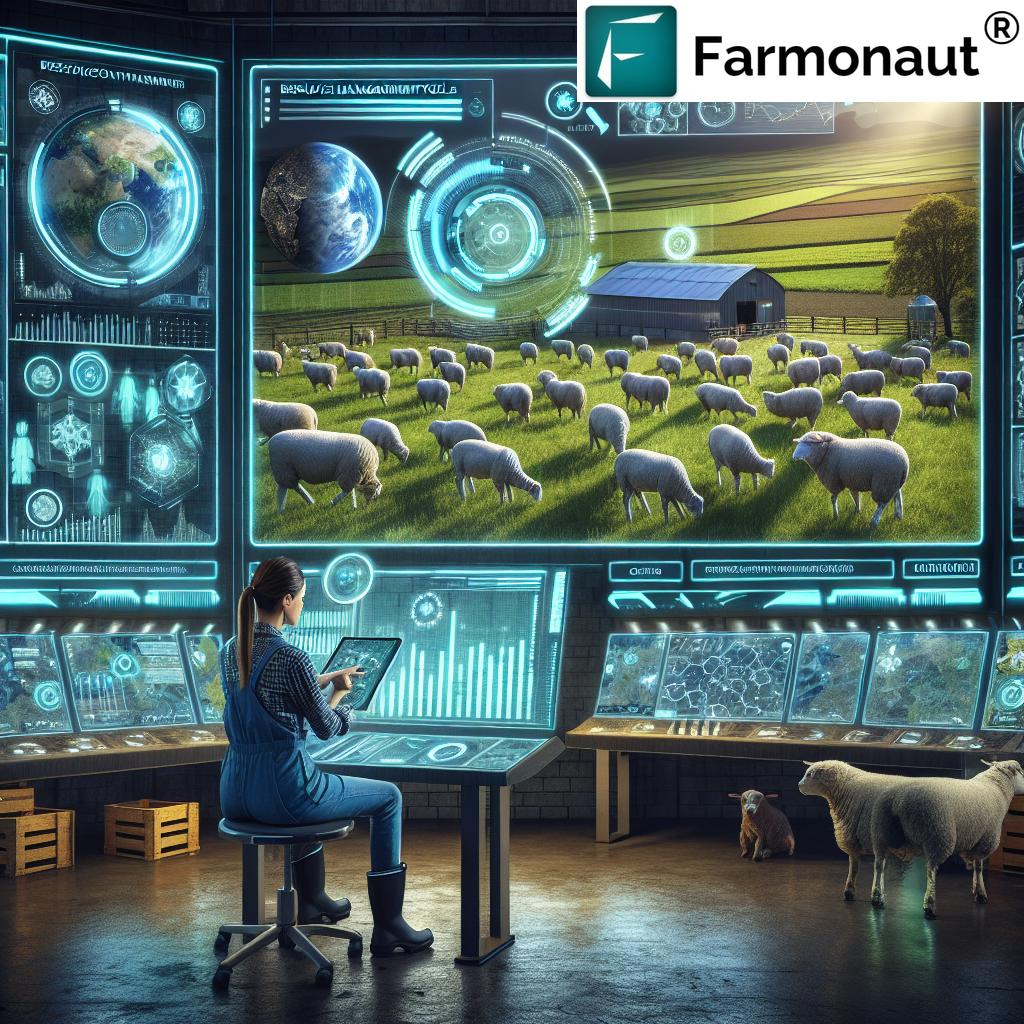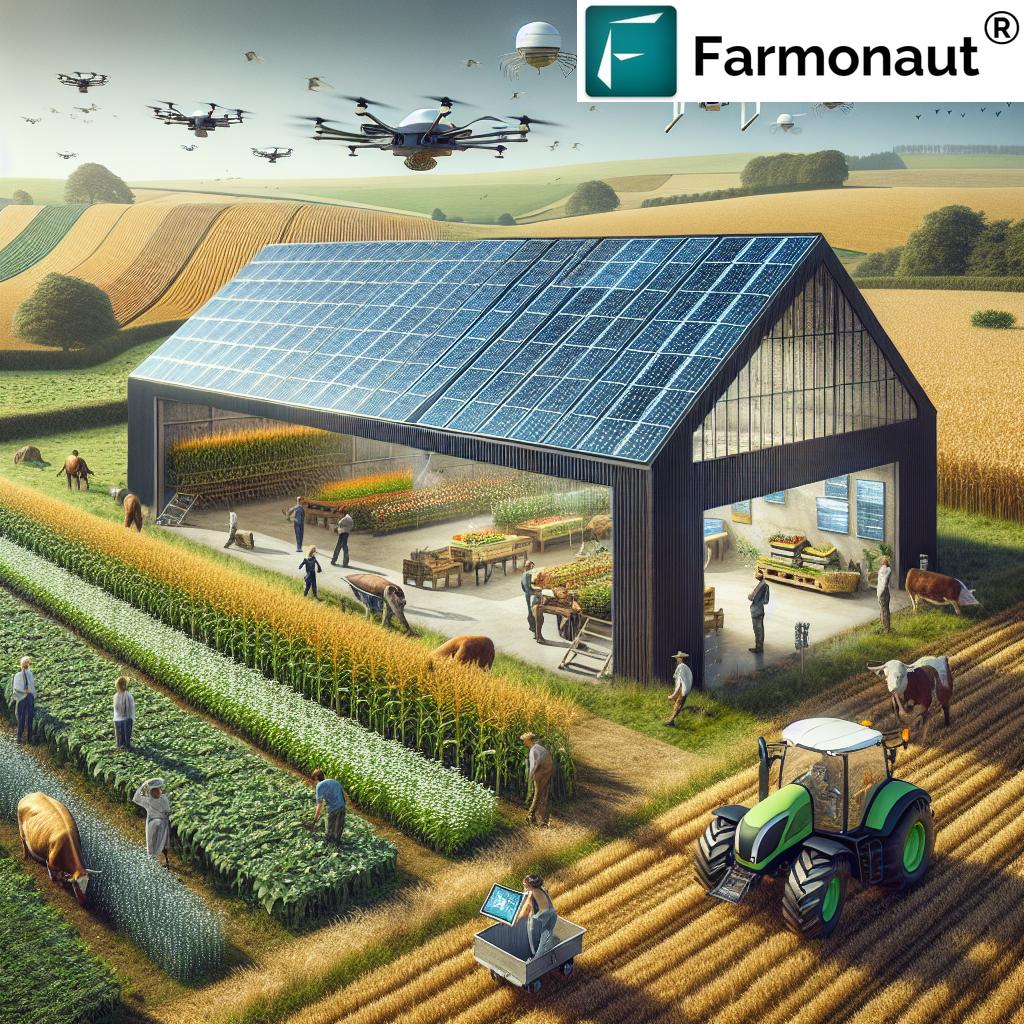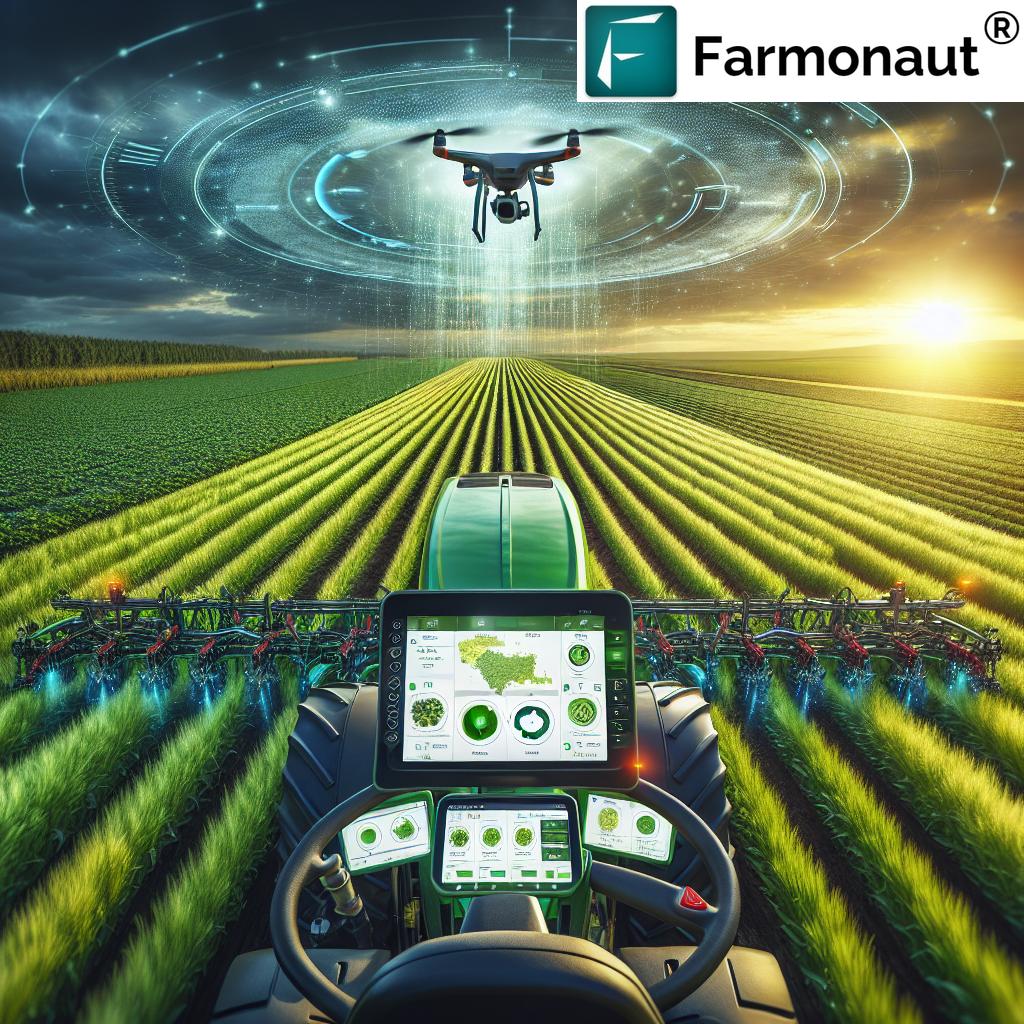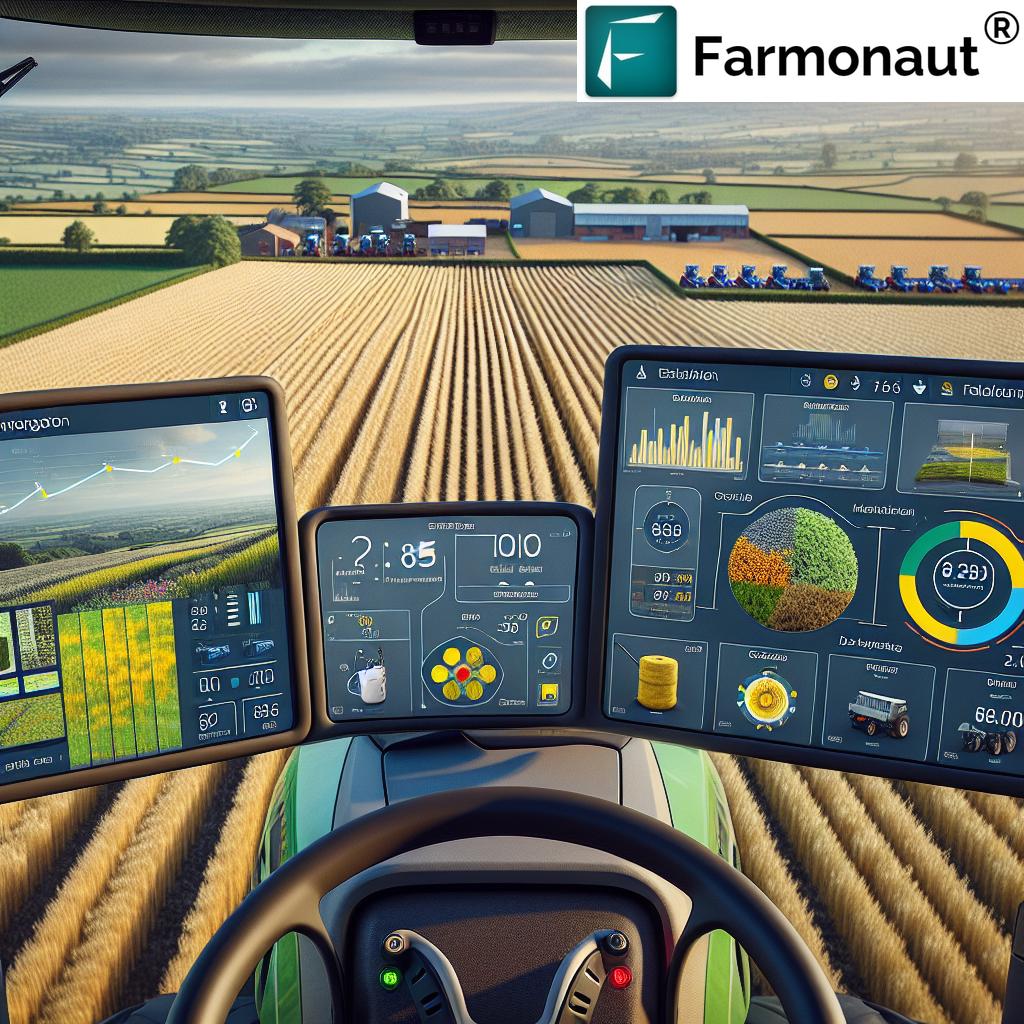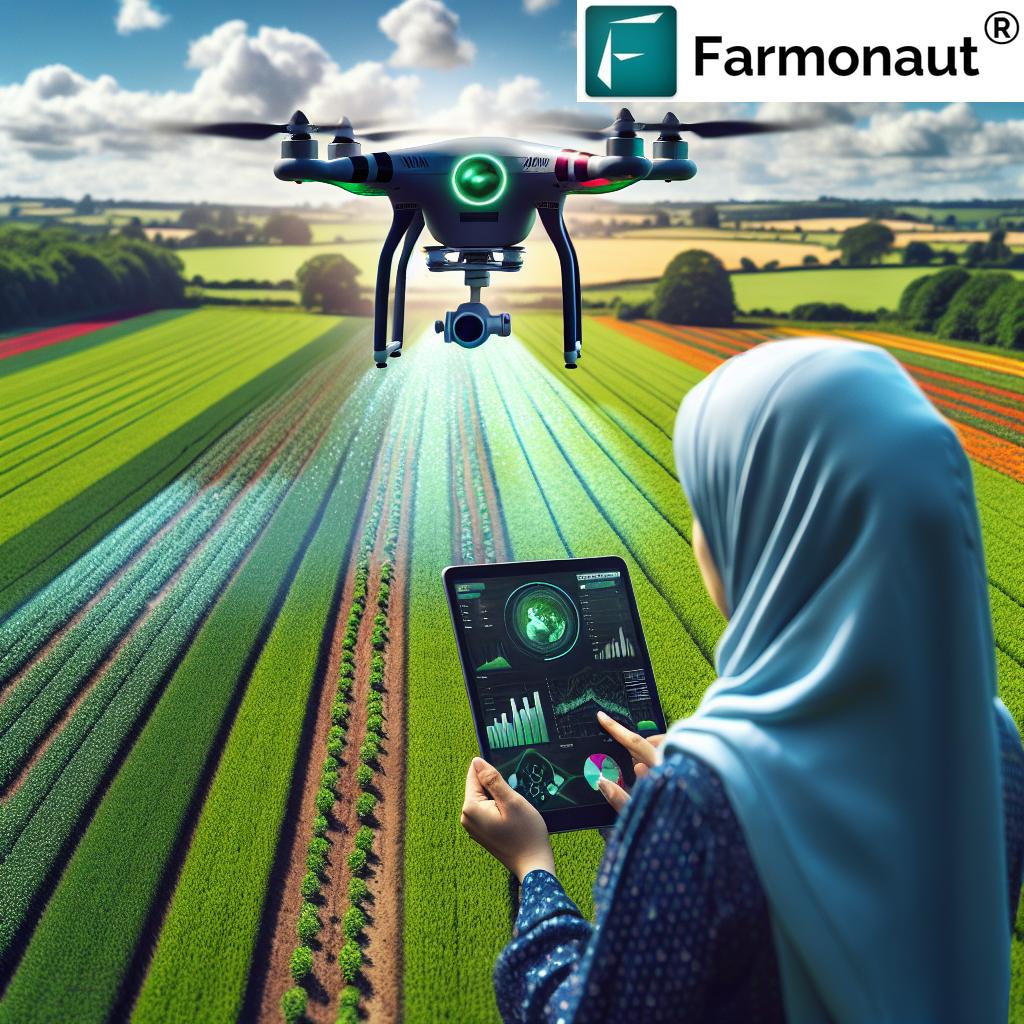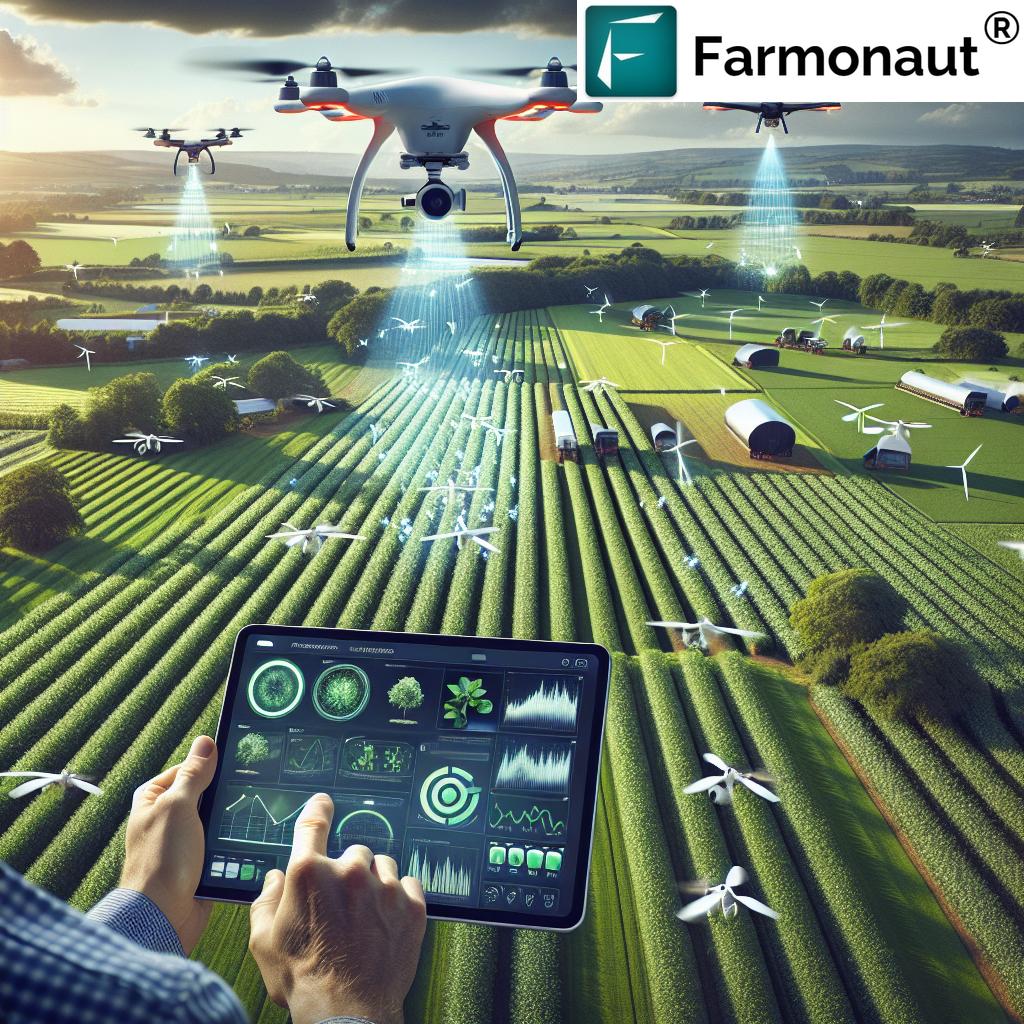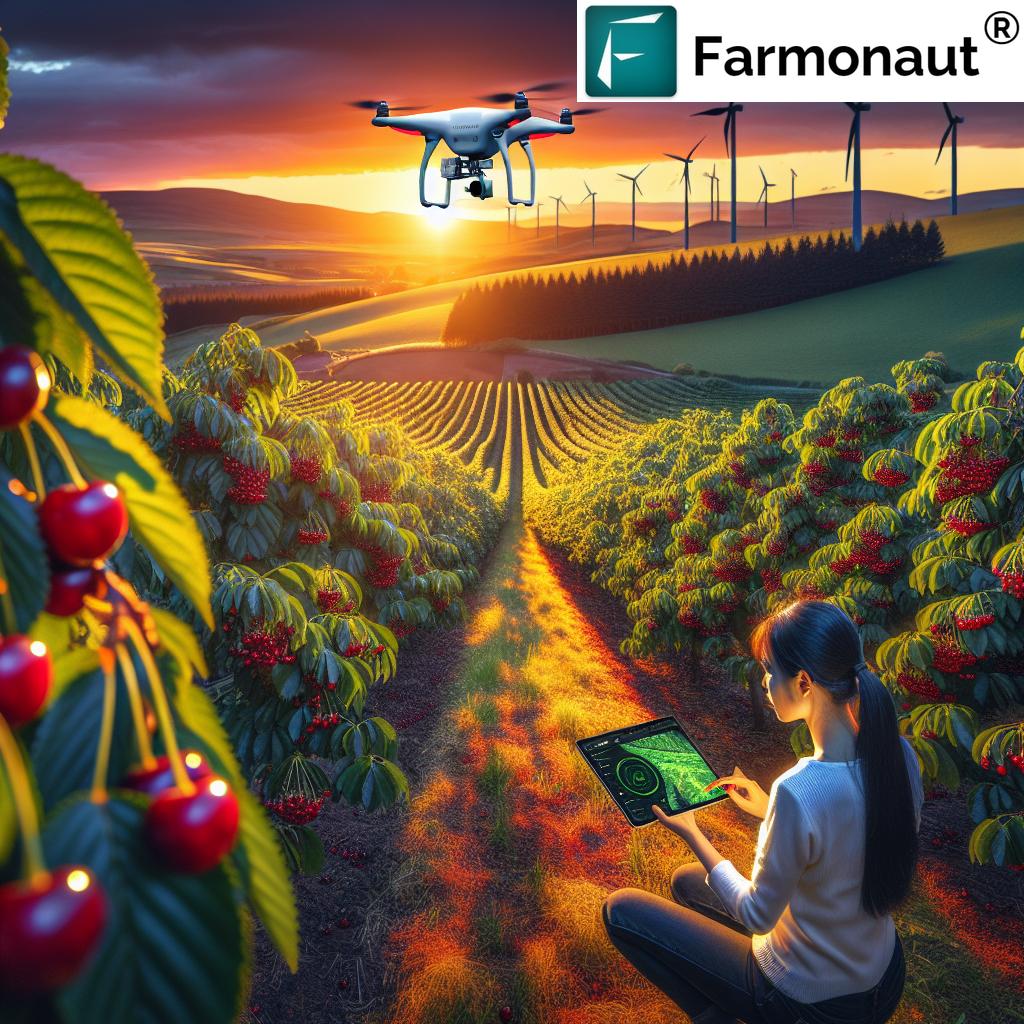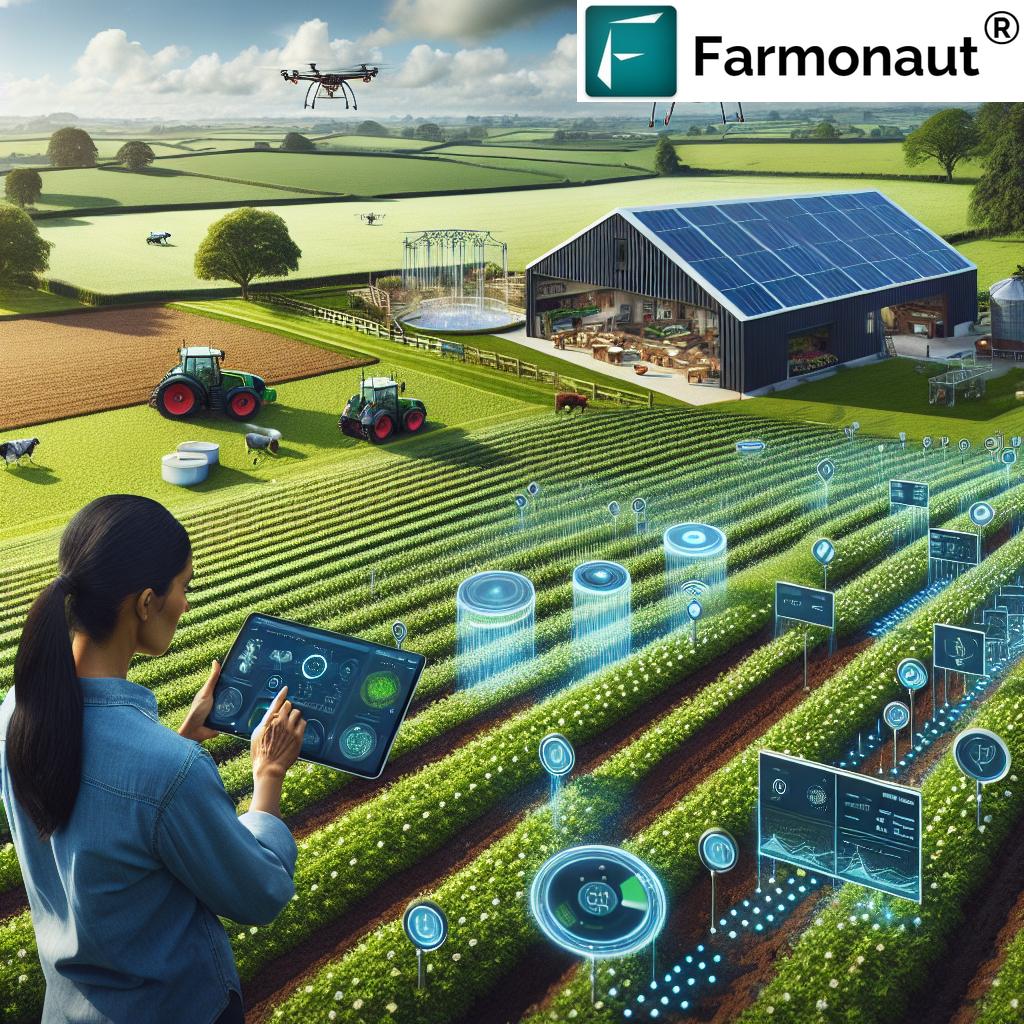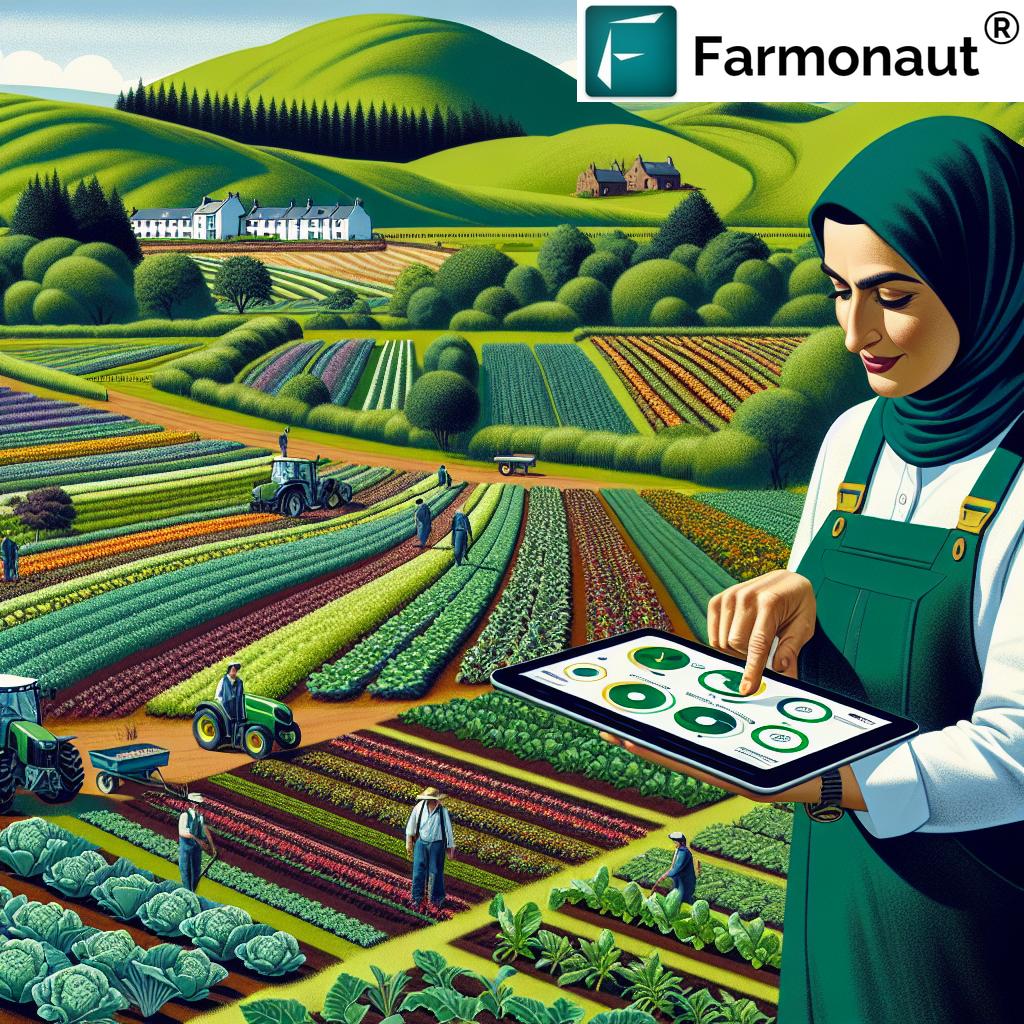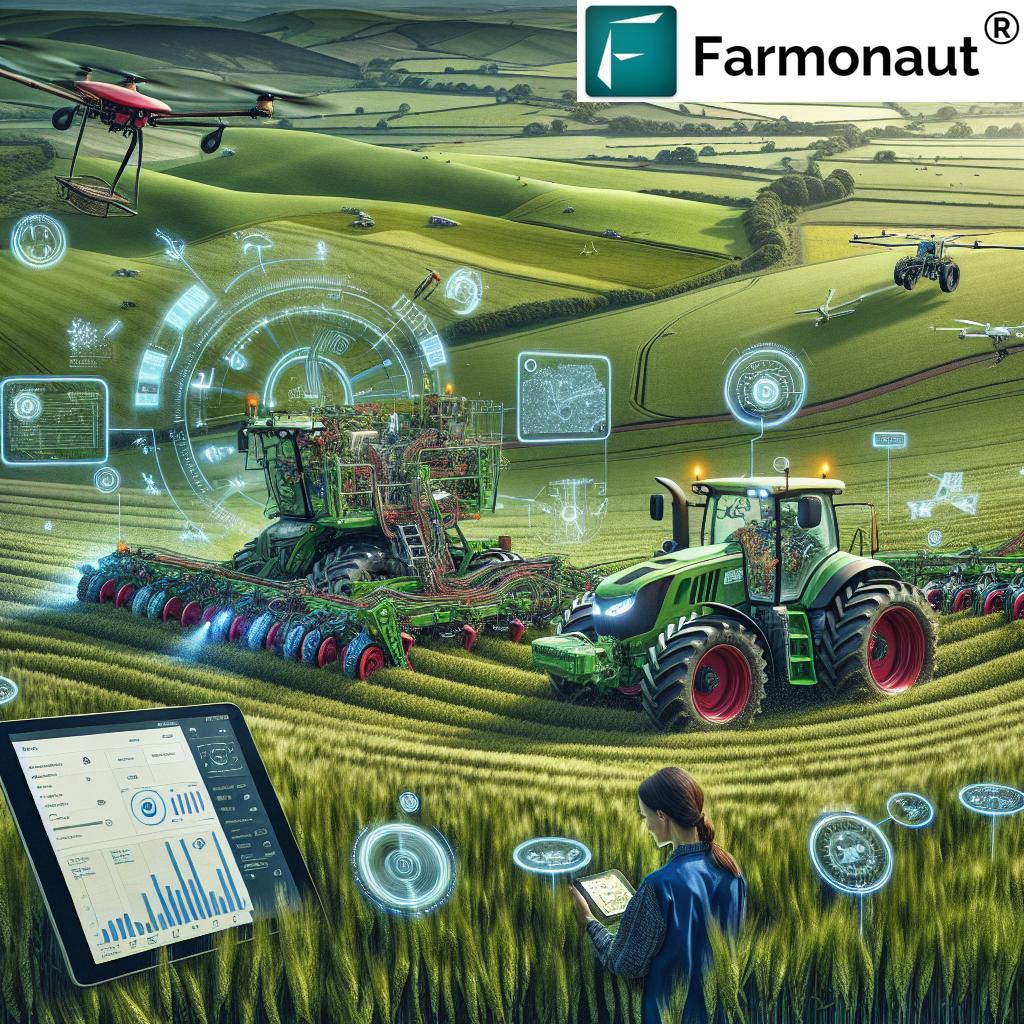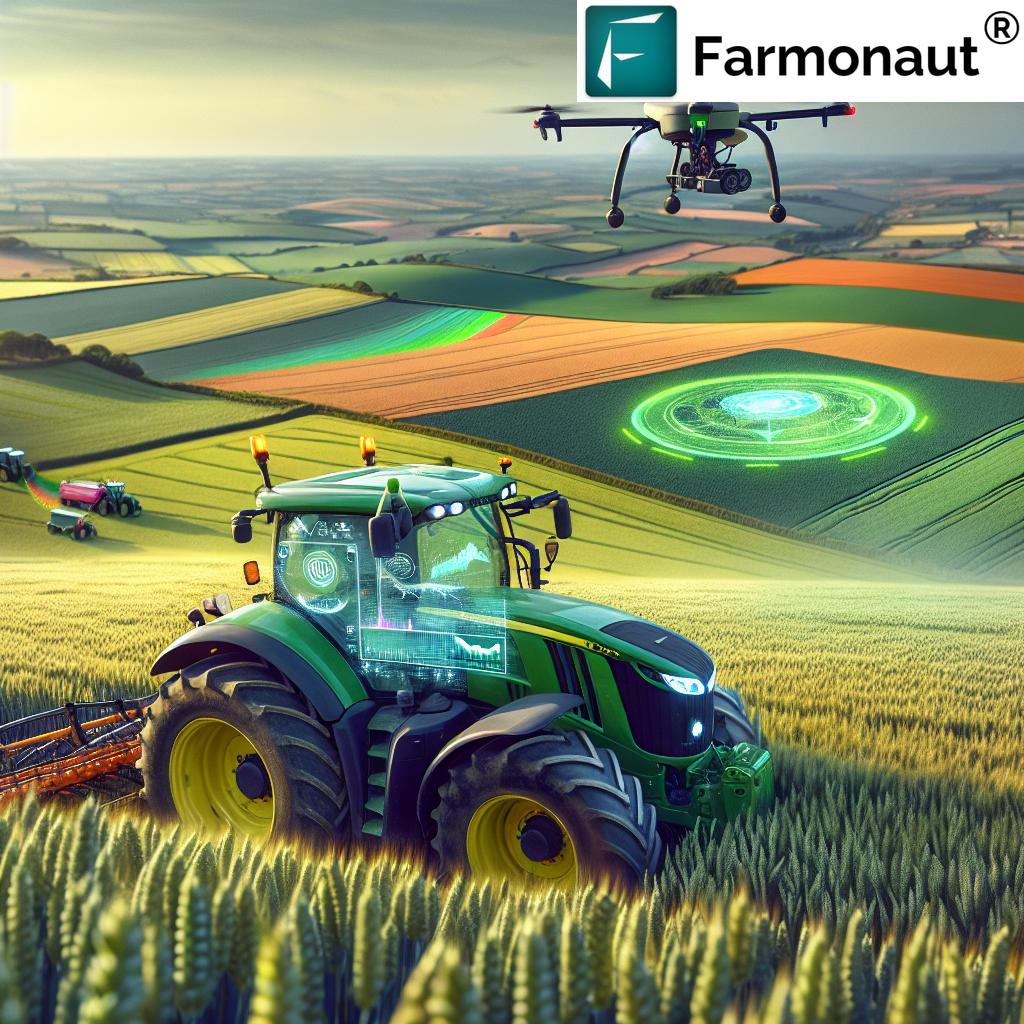Revolutionizing UK Agriculture: How Precision Farming and Smart Solutions Are Transforming British Farms
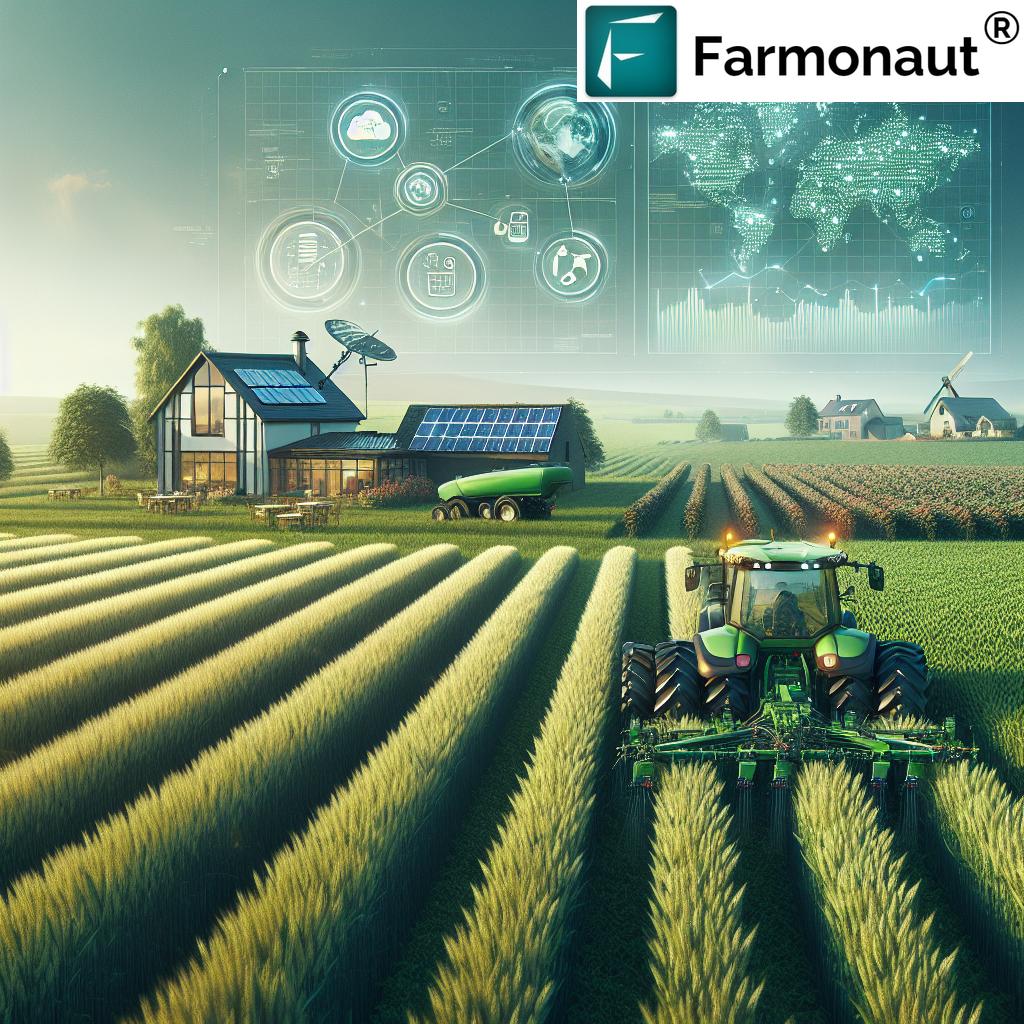
“Precision farming techniques can reduce water usage by up to 30% in UK agriculture, promoting sustainable resource management.“
In the heart of the British countryside, a quiet revolution is taking place. The rolling hills and vast farmlands that have long been the backbone of UK agriculture are undergoing a remarkable transformation. At the forefront of this change is precision farming, a suite of smart solutions that are reshaping the way we approach farming in the 21st century. As representatives of Farmonaut, we’re excited to explore how these innovative technologies are not only boosting productivity but also promoting sustainable farming practices across the United Kingdom.
The agricultural landscape in the UK is evolving rapidly, with farmers embracing cutting-edge agricultural technology to meet the challenges of modern food production. From advanced crop monitoring systems to sophisticated farm management solutions, the integration of technology in agriculture is no longer a futuristic concept but a present-day reality. In this comprehensive blog post, we’ll delve into the world of precision agriculture and examine how it’s revolutionizing British farms.
The Rise of Precision Agriculture in the UK
Precision agriculture, also known as precision farming, is a management approach that uses information technology to ensure crops and soil receive exactly what they need for optimum health and productivity. This approach is gaining significant traction in the UK, where farmers are increasingly turning to smart farming techniques to optimize their operations.
- Satellite-based monitoring
- IoT sensors for real-time data collection
- AI-powered analytics for decision-making
- Drone technology for aerial surveying
These technologies form the backbone of precision farming, allowing farmers to make data-driven decisions that were previously based on intuition and experience alone. The result is a more efficient, profitable, and environmentally friendly approach to agriculture.
Farmonaut: Pioneering Precision Farming Solutions
At Farmonaut, we’re proud to be at the forefront of this agricultural revolution. Our mission is to make precision agriculture accessible and affordable for farmers across the UK and beyond. Through our innovative platform, we offer a range of services designed to empower farmers with the tools they need to succeed in today’s competitive agricultural landscape.
Explore our cutting-edge solutions:
Our web application provides a comprehensive suite of tools for farm management, including:
- Real-time crop health monitoring
- Weather forecasting and analysis
- Soil moisture tracking
- Yield prediction models
For those looking to integrate our technology into their existing systems, we offer robust API solutions:
Our mobile applications ensure that farmers can access critical information on-the-go:
The Impact of Smart Farming on UK Agriculture
The adoption of precision farming techniques is having a profound impact on UK agriculture. Let’s explore some of the key areas where these smart solutions are making a difference:
1. Crop Monitoring and Health Management
One of the most significant advantages of precision farming is the ability to monitor crop health in real-time. Through satellite imagery and IoT sensors, farmers can now detect issues such as pest infestations, nutrient deficiencies, and water stress before they become visible to the naked eye. This early detection allows for targeted interventions, reducing the need for broad-spectrum pesticides and promoting more sustainable farming practices.
2. Resource Optimization
Precision agriculture enables farmers to apply resources such as water, fertilizers, and pesticides with pinpoint accuracy. This targeted approach not only reduces waste but also minimizes the environmental impact of farming activities. For example, variable-rate irrigation systems can adjust water application based on soil moisture levels, leading to significant water savings.
3. Yield Prediction and Planning
Advanced analytics and machine learning algorithms are revolutionizing yield prediction. By analyzing historical data, weather patterns, and current crop conditions, farmers can make more accurate yield forecasts. This information is invaluable for planning harvests, managing storage, and negotiating contracts with buyers.
4. Soil Health Management
Maintaining soil health is crucial for long-term agricultural sustainability. Precision farming tools allow farmers to monitor soil conditions closely, tracking factors such as pH levels, nutrient content, and organic matter. This data enables the implementation of targeted soil management strategies, improving soil health over time.
The Role of Agricultural Data Analytics
At the heart of precision farming lies the power of data. Agricultural data analytics is transforming the way farmers make decisions, moving from intuition-based farming to data-driven agriculture. Here’s how data analytics is revolutionizing UK farms:
- Predictive Analytics: By analyzing historical data and current conditions, farmers can predict potential issues and take preventive measures.
- Performance Benchmarking: Data analytics allows farmers to compare their performance against industry standards and identify areas for improvement.
- Risk Management: Advanced analytics help in assessing and mitigating various risks, from weather-related challenges to market fluctuations.
- Supply Chain Optimization: Data-driven insights enable better coordination across the agricultural supply chain, reducing waste and improving efficiency.
“Advanced crop monitoring systems have increased crop yields by 15-20% on British farms adopting smart farming solutions.“
Remote Sensing in Agriculture: A Game-Changer for British Farms
Remote sensing technology is playing a pivotal role in the transformation of UK agriculture. By providing a bird’s-eye view of farmlands, remote sensing offers invaluable insights that were previously unattainable. Here’s how this technology is benefiting British farmers:
1. Crop Health Assessment
Satellite imagery and multispectral sensors can detect variations in crop health across large areas. This allows farmers to identify problem areas quickly and take corrective action before issues escalate.
2. Precision Application of Inputs
By creating detailed maps of field variability, remote sensing enables the precise application of fertilizers, pesticides, and water. This targeted approach not only saves resources but also minimizes environmental impact.
3. Yield Estimation
Remote sensing data can be used to estimate crop yields with high accuracy. This information is crucial for harvest planning, storage management, and market forecasting.
4. Land Use Planning
Satellite imagery helps in mapping and monitoring land use patterns, assisting farmers and policymakers in making informed decisions about agricultural land management.
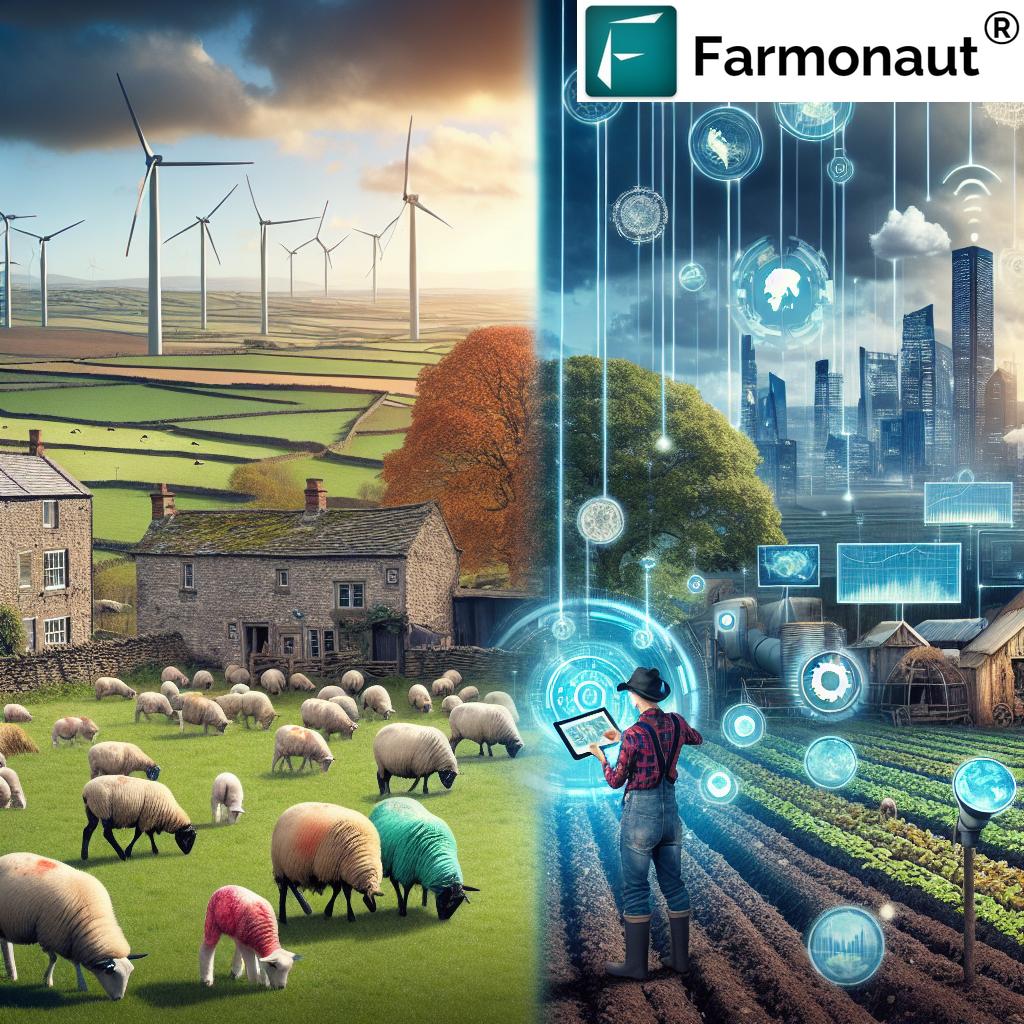
The Economic Impact of Precision Farming on Rural Communities
The adoption of precision farming technologies is not just transforming individual farms; it’s having a ripple effect on entire rural communities across the UK. Here’s how smart farming solutions are contributing to rural economic development:
- Job Creation: The rise of agritech is creating new job opportunities in rural areas, from data analysts to drone operators.
- Increased Farm Profitability: By optimizing resource use and improving yields, precision farming is helping to boost farm incomes.
- Attracting Young Farmers: The high-tech nature of modern farming is attracting younger generations to agriculture, helping to address the aging farmer population.
- Sustainable Rural Development: As farms become more profitable and efficient, they contribute to the overall economic health of rural communities.
The Role of Agricultural Governance in Supporting Smart Farming
The transition to precision agriculture requires support from various stakeholders, including governmental and professional organizations. In the UK, several entities are playing crucial roles in facilitating this transition:
National Farmers’ Union (NFU)
The NFU is at the forefront of supporting British farmers in adopting new technologies. They provide:
- Educational resources on precision farming
- Advocacy for policies that support agritech adoption
- Networking opportunities for farmers to share best practices
Department for Environment, Food & Rural Affairs (DEFRA)
DEFRA is instrumental in shaping agricultural policy that encourages innovation. Their initiatives include:
- Grants for technology adoption
- Research funding for precision agriculture
- Regulatory frameworks that support sustainable farming practices
Agricultural Technology Associations
Various professional associations are working to promote the adoption of smart farming solutions:
- Organizing industry events and conferences
- Providing training and certification programs
- Facilitating partnerships between tech companies and farmers
Challenges and Opportunities in Implementing Precision Farming
While the benefits of precision farming are clear, its implementation is not without challenges. However, each challenge presents an opportunity for innovation and growth:
Challenges:
- Initial Investment Costs: The upfront costs of precision farming equipment can be significant.
- Digital Skills Gap: Many farmers need training to effectively use new technologies.
- Data Privacy and Security: Concerns about the collection and use of farm data need to be addressed.
- Connectivity Issues: Rural areas often lack the robust internet infrastructure needed for some smart farming solutions.
Opportunities:
- Innovative Financing Models: Development of new financing options to help farmers adopt technology.
- Educational Programs: Creation of training programs to upskill farmers in digital technologies.
- Data Governance Frameworks: Establishment of clear guidelines for agricultural data use and protection.
- Rural Connectivity Initiatives: Investment in improving rural broadband and 5G coverage.
The Future of UK Agriculture: Trends and Predictions
As we look to the future, several trends are likely to shape the continued evolution of UK agriculture:
- Increased Automation: The use of autonomous vehicles and robotics in farming is set to grow, further increasing efficiency and reducing labor costs.
- AI and Machine Learning: These technologies will become more sophisticated, offering even more precise predictions and recommendations.
- Blockchain in Agriculture: The use of blockchain for traceability and supply chain management is likely to increase, enhancing food safety and consumer trust.
- Vertical and Urban Farming: As land becomes scarcer, we may see more investment in vertical farming technologies, especially near urban centers.
- Climate-Smart Agriculture: With increasing focus on sustainability, technologies that help farms adapt to and mitigate climate change will become crucial.
Precision Farming Technologies and Their Impact on UK Agriculture
| Technology | Primary Function | Estimated Adoption Rate in UK (%) | Potential Yield Increase (%) | Environmental Impact |
|---|---|---|---|---|
| Remote Sensing | Crop Monitoring | 35 | 10-15 | High |
| IoT Sensors | Soil Health Management | 25 | 8-12 | Medium |
| AI-powered Analytics | Yield Prediction | 20 | 15-20 | Low |
| Drone Technology | Precision Spraying | 15 | 5-10 | High |
| Variable Rate Technology | Resource Optimization | 30 | 10-15 | High |
Conclusion: Embracing the Future of British Agriculture
The revolution in UK agriculture is well underway, driven by precision farming and smart solutions that are transforming the way we grow food. From the rolling hills of England to the rugged landscapes of Scotland, farmers across the nation are embracing these technologies to increase productivity, enhance sustainability, and secure the future of British farming.
At Farmonaut, we’re committed to being a part of this transformation. Our suite of tools and services is designed to empower farmers with the data and insights they need to thrive in this new era of agriculture. As we continue to innovate and expand our offerings, we remain dedicated to our mission of making precision agriculture accessible and affordable for all.
The journey towards a smarter, more sustainable agricultural sector is ongoing, and the challenges are significant. However, with continued investment in research, supportive policies, and a willingness to embrace change, the UK is well-positioned to lead the way in agricultural innovation.
As we look to the future, one thing is clear: the farms of tomorrow will be smarter, more efficient, and more sustainable than ever before. By embracing precision farming and smart solutions, we can ensure that UK agriculture not only survives but thrives in the face of global challenges, continuing to feed the nation and contribute to the world’s food security for generations to come.
Farmonaut Subscriptions
Frequently Asked Questions (FAQ)
1. What is precision farming?
Precision farming is an agricultural management concept that uses technology to observe, measure, and respond to variability in crops. It involves using data from various sources like satellites, drones, and sensors to make informed decisions about planting, fertilizing, and harvesting crops.
2. How does Farmonaut contribute to precision farming in the UK?
Farmonaut provides a range of tools and services that enable UK farmers to implement precision farming techniques. This includes satellite-based crop monitoring, AI-powered advisory systems, and data analytics platforms that help farmers make data-driven decisions to optimize their operations.
3. What are the main benefits of adopting precision farming techniques?
The main benefits include increased crop yields, reduced input costs (such as water, fertilizers, and pesticides), improved environmental sustainability, and more efficient use of resources. It also helps in better farm management and decision-making.
4. Is precision farming only suitable for large farms?
No, precision farming can be beneficial for farms of all sizes. While some technologies might require significant investment, many solutions, including those offered by Farmonaut, are scalable and can be adapted to suit the needs and budgets of smaller farms.
5. How does precision farming contribute to sustainability in agriculture?
Precision farming promotes sustainability by optimizing resource use, reducing waste, and minimizing the environmental impact of farming activities. It allows for targeted application of inputs, which can significantly reduce the use of water, fertilizers, and pesticides.
6. What role does AI play in precision farming?
AI plays a crucial role in analyzing the vast amounts of data collected through various sensors and imaging technologies. It helps in predicting crop yields, detecting plant diseases early, optimizing irrigation, and providing personalized recommendations for farm management.
7. How can farmers get started with precision farming?
Farmers can start by adopting simple technologies like GPS-guided tractors or basic soil sensors. They can then gradually incorporate more advanced solutions like satellite imagery analysis or IoT devices. Platforms like Farmonaut offer user-friendly entry points into precision farming.
8. What are the challenges in implementing precision farming in the UK?
Some challenges include the initial cost of technology, the need for digital skills training, ensuring reliable internet connectivity in rural areas, and addressing data privacy concerns. However, many of these challenges are being actively addressed through various initiatives and technological advancements.
9. How does precision farming impact the rural economy?
Precision farming can boost the rural economy by increasing farm profitability, creating new job opportunities in the agritech sector, and attracting younger generations to agriculture. It also promotes sustainable rural development by making farming more efficient and environmentally friendly.
10. What future developments can we expect in precision farming?
Future developments are likely to include more advanced AI and machine learning applications, increased use of autonomous vehicles and robotics, further integration of blockchain for supply chain management, and the development of more sophisticated sensors and imaging technologies.





